
Highlights of Buenos Aires
Dynamic, sophisticated, irresistible; Buenos Aires is a seductive and attractive city just waiting to be explored.

Laura Pattara | 12 July 2025
With credit to Pia Knarston & Flor BojorquezLet your taste buds take the lead on this delicious adventure through Latin America’s must-try dishes—handpicked favourites from Viva’s own travel specialists.
From sizzling street eats to heritage meals you’ll find nowhere else, Latin America is home to some of the world's most celebrated food cultures. Every bite tells a story here, be it shaped by ancient traditions, colonial influence or more modern experimentation. We sat down with Flor and Pia, two of Viva’s travel specialists (and self-confessed foodies), to help us go beyond the usual (looking at you, empanada) and rounded up our top picks for the most popular food in South America and Central America.
Here are the must-try dishes you (and your taste buds) shouldn’t miss:
2. Asado with Chimichurri (Argentina)
6. Arepas (Venezuela & Colombia)
8. Tamales (Mexico, Central America, Bolivia)
10. Dulce de Leche (Argentina & Beyond)
12. Churros de la Virgen del Carmen (Lima, Peru)
13. Amazonian Fried Bananas (Peru, Ecuador, Brazil)
Bonus Sips: Must-Try Drinks in Latin America
15. Mate (Argentina, Uruguay, Paraguay)
17. Aguardiente (Colombia & Ecuador)
The Top 5 At A GlanceShort on time? These iconic bites are a must!
|
Fresh, zesty, and a lifesaver on a hot day, ceviche is Peru’s most iconic dish, and arguable the most popular food in South America. It is also the one Peruvians abroad dream about most. Traditionally made with raw white fish “cooked” in sharp lime juice, it’s spiked with red onion, chilli, and coriander, and typically served alongside sweetcorn or sweet potato for a perfect balance of brightness and heat. “The first thing I do when I go home is eat ceviche,” says Flor, a Peruvian native and Viva’s Peru expert. “It’s the one South American food I miss more than any other.”
Fascinating tidbit: Archaeologists have traced early versions of ceviche back over 2,000 years to the Moche people of northern Peru.
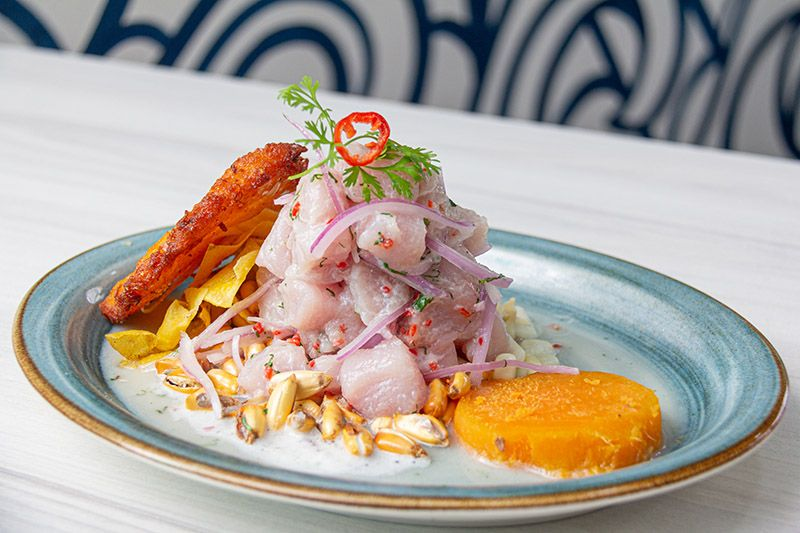
Long before limes arrived, the Moche marinated seafood with fermented tumbo (native passionfruit) and chilli.
One of the most iconic foods in South America, Argentina’s asado is an unmissable weekly ritual, a social event, and a point of national pride. A bevy of cuts of beef are grilled low and slow over wood or charcoal fires, seasoned with only salt, and served with chimichurri, a zingy green sauce made of parsley, garlic, oregano, vinegar, and oil.
“Steak in Argentina is so tender, you barely need a knife,” says Pia, Viva’s Argentina Tour specialist.
If you're heading to Buenos Aires, ask us about the Fogón Asado experience included in our Signature packages. It's a brilliant modern take on tradition—complete with a hands-on chimichurri-making session.
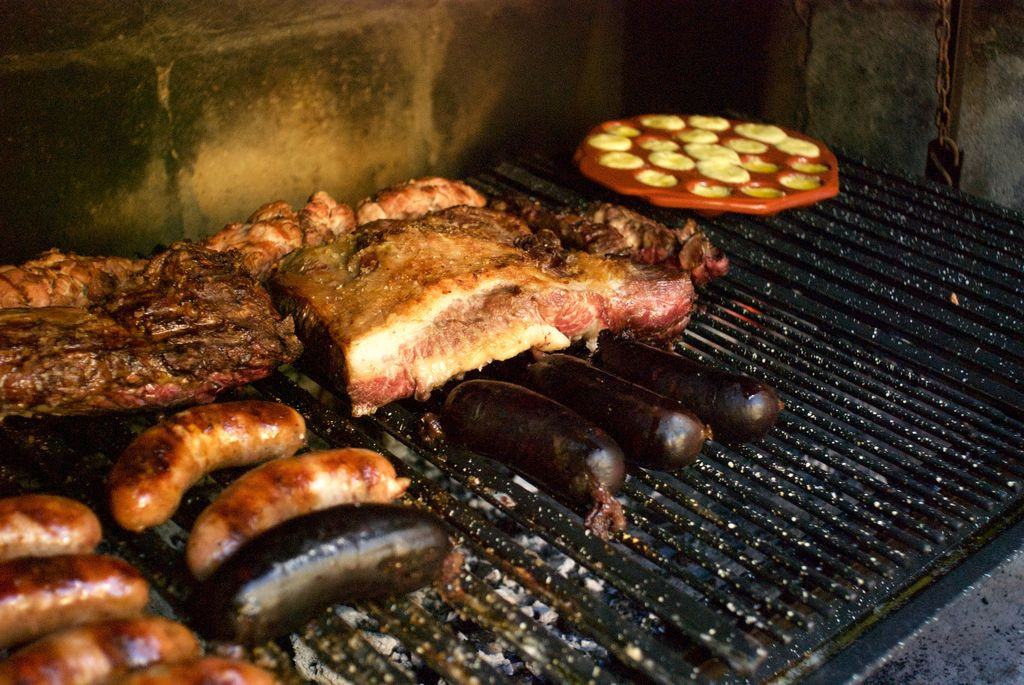
In Argentina, “parrilla” means both the grill and the place. So heading to the parrilla could mean a restaurant or the backyard barbecue.
Forget the Tex-Mex hard shells: authentic Mexican tacos are all about soft corn tortillas piled high with juicy fillings and bold toppings, eaten street-side from a small but bustling stall. One of the most beloved varieties is taco al pastor, made with spit-roasted pork shaved straight off a vertical rotisserie and topped with pineapple, onion, coriander, and a squeeze of lime.
> Check out more of the Best Foods to Try in Mexico
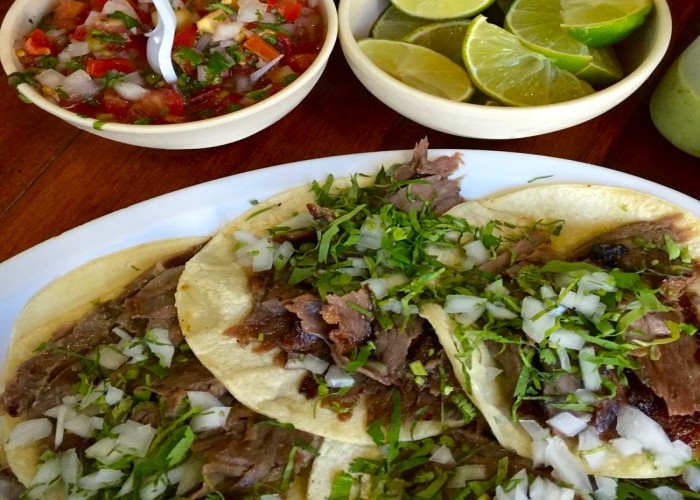
Tacos al pastor trace their roots to Lebanese shawarma, brought to Mexico by immigrants in the early 1900s.
High up on Bolivia’s Isla del Sol, the Aymara people still gather for aptapi—a traditional communal meal where everyone contributes something to share. It’s a colourful spread of local ingredients like Andean potatoes, maize, fried cheese, quinoa, and Lake Titicaca fish, all arranged on a woven blanket laid out on the ground.
“We weren’t sitting on the ground, and it was just our group, but we were outside on the shores of Lake Titicaca with the most stunning views and a spread you won’t forget,” says Pia. “You still feel part of something old and meaningful, especially in the way the meal is served.” Every ingredient in aptapi carries significance, so ask your guide about the symbolism behind each delicious morsel.
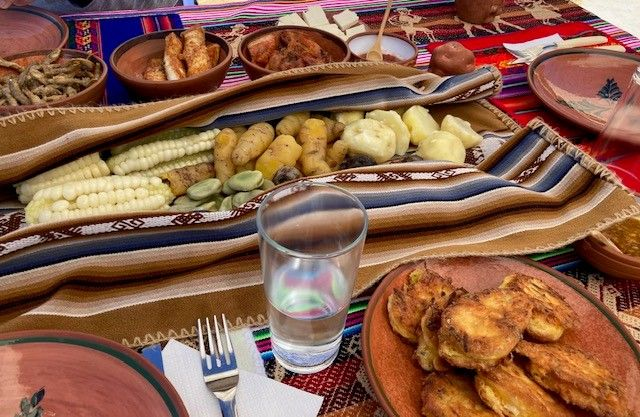
Aptapi comes from the Aymara word apthapiña, or “to bring together the first fruits of the harvest".
Rich, spiced, and layered with history, mole poblano is a sauce made from chilli, chocolate, nuts, and spices, traditionally served over chicken. It's thought to have originated in colonial Puebla. With over 20 ingredients, mole takes time, but one spoonful and you'll understand why chocolate and chicken just work and why it's worth the wait.
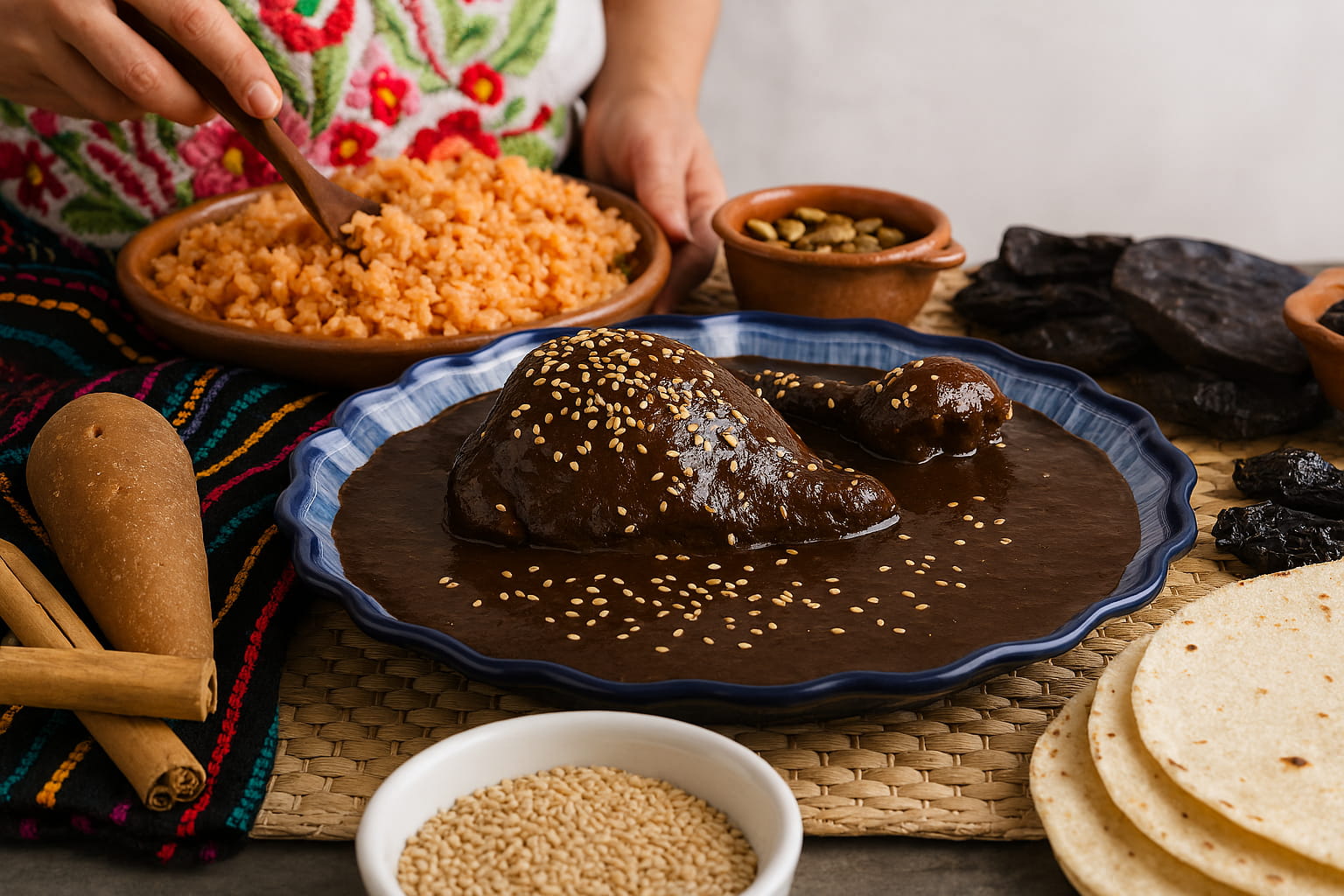
Legend says mole poblano was invented by nuns in a Puebla convent who had to improvise a dish for an unexpected visiting archbishop.
The best food in Latin America when you’re famished and in a hurry, arepas are cornmeal patties, grilled or fried and split open for fillings. Stuff them with cheese, pulled meat, or avocado, and you've got the ultimate handheld snack. In Colombia, they tend to be thinner and plainer; in Venezuela, they are thicker and bursting with fillings. Either way, drench them in home-made chilli sauce for the ultimate kick.
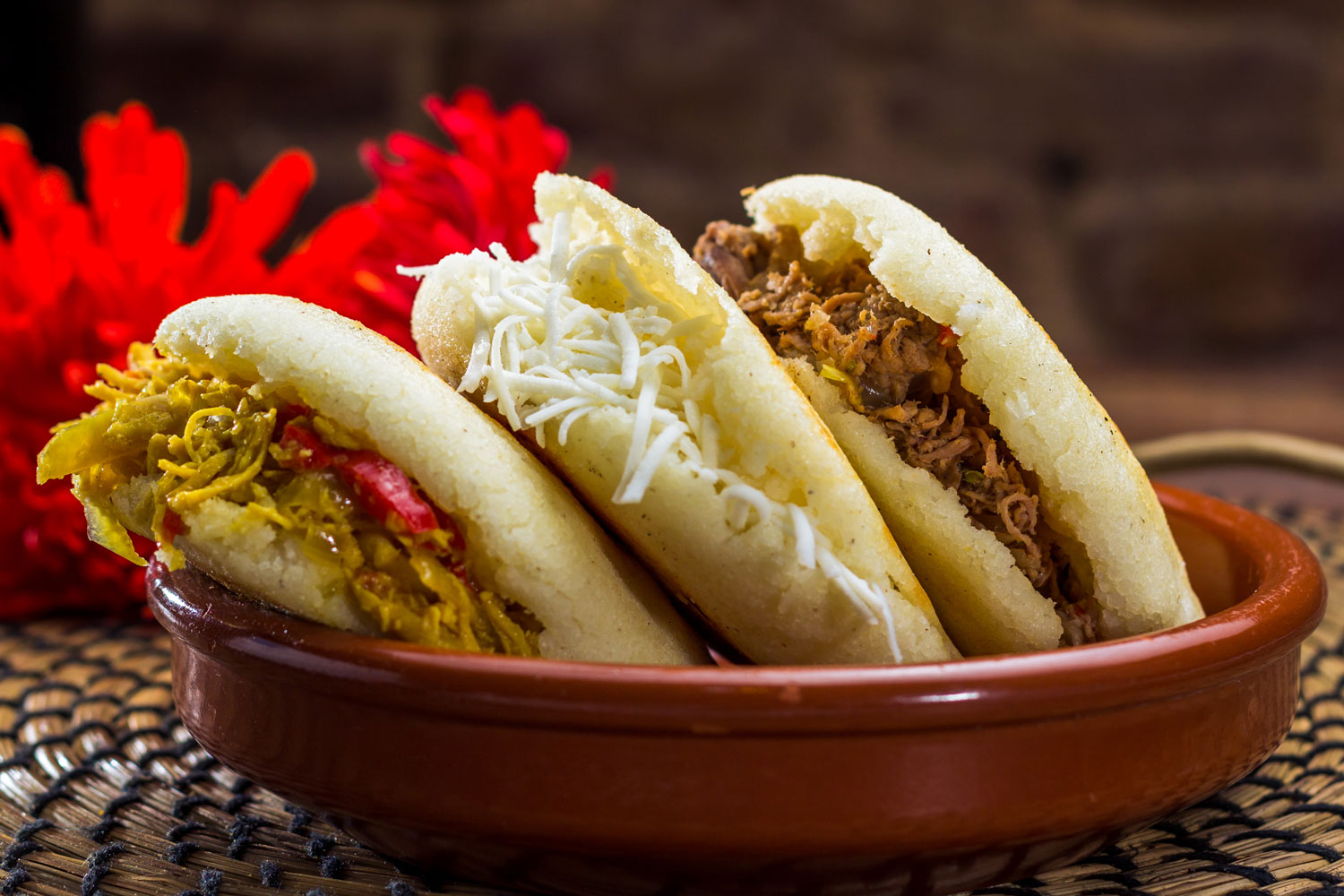
Arepas date back over 3,000 years, with early versions made by the Timoto-Cuica people long before Colombia or Venezuela existed.
Straight from the Amazon, açaí has gone from jungle staple to global superfood phenomenon. But in Brazil, it’s still a humble and beloved classic, especially in hot, energy-sapping places where you need serious fuel to get through the day. Locals blend the frozen berries into a thick purple smoothie, often topped with banana, granola, and a drizzle of honey.
“It’s what I always grab after a swim or a long walk in the sun,” says Flor. “Cold, sweet, and surprisingly filling.”
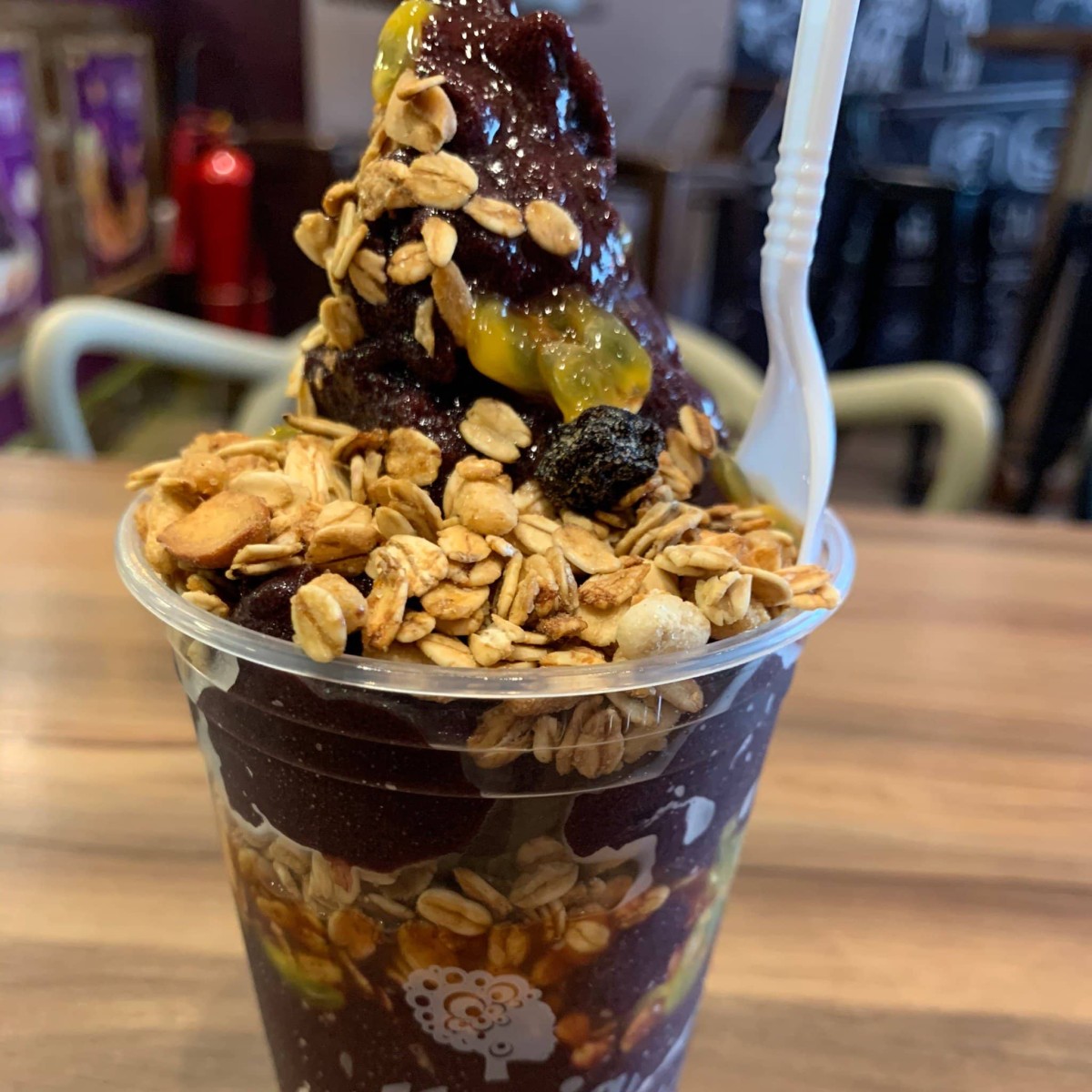
In Brazil, açaí was once reserved for Amazonian warriors who believed it boosted strength and stamina before battle.
Wrapped, steamed, and full of history, tamales have been a part of Latin American life for thousands of years. Made from corn dough (masa) and stuffed with anything from pork in chilli sauce to sweet raisins and cinnamon, they’re wrapped in banana or corn husks and steamed to perfection.
You’ll find endless local varieties, from Mexico and Bolivian humintas to Guatemalan tamales colorados. Everyone swears their abuela makes the best.
“I still remember buying tamales from an old lady on the roadside,” says Pia. “They were hot, simple, and better than anything I’ve had in a restaurant.”
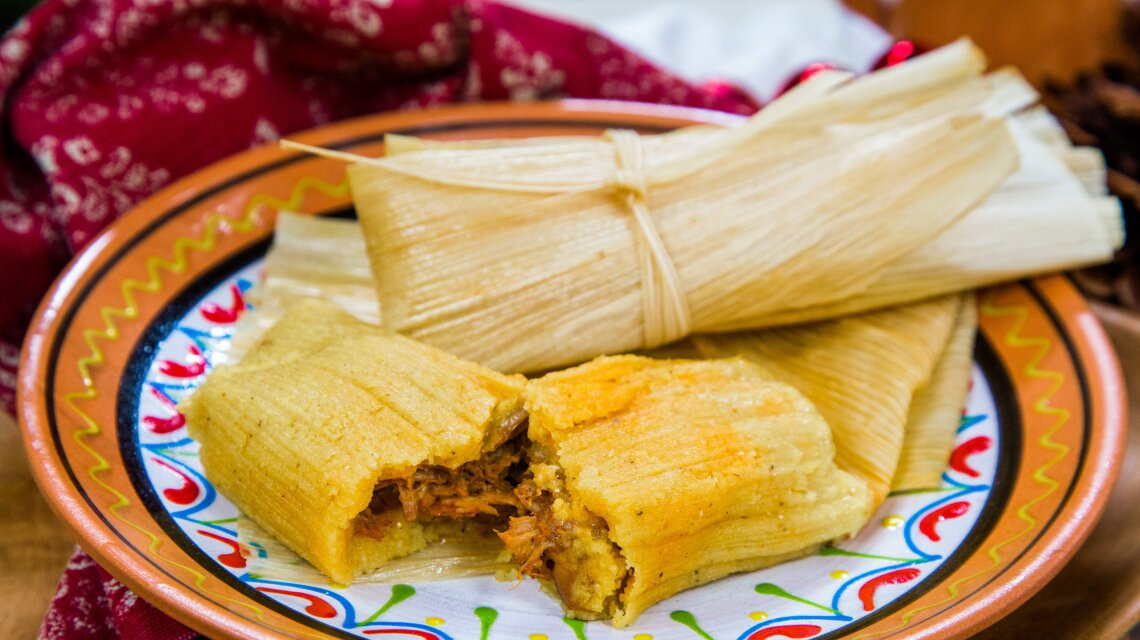
Tamales date back to the Mesoamerican cultures but loved by the Aztecs and Maya, who packed them as portable meals for warriors and travellers on the move.
Sweet, fragrant, and spoon-soft, chirimoya (aka custard apple) is one of the Andes’ most beloved fruits. It’s especially prized in Peru, Bolivia, and Ecuador, where locals proudly claim it as their own. Its creamy, vanilla-like flesh is often eaten fresh or turned into juice, smoothies, and even ice cream. Native to the Andean highlands, it thrives in sunny mountain valleys across Peru and Bolivia.
“It’s one of those fruits you only need to try once to fall in love with,” says Pia. “The flavour’s like a tropical dessert, but even better because it grows on trees!”
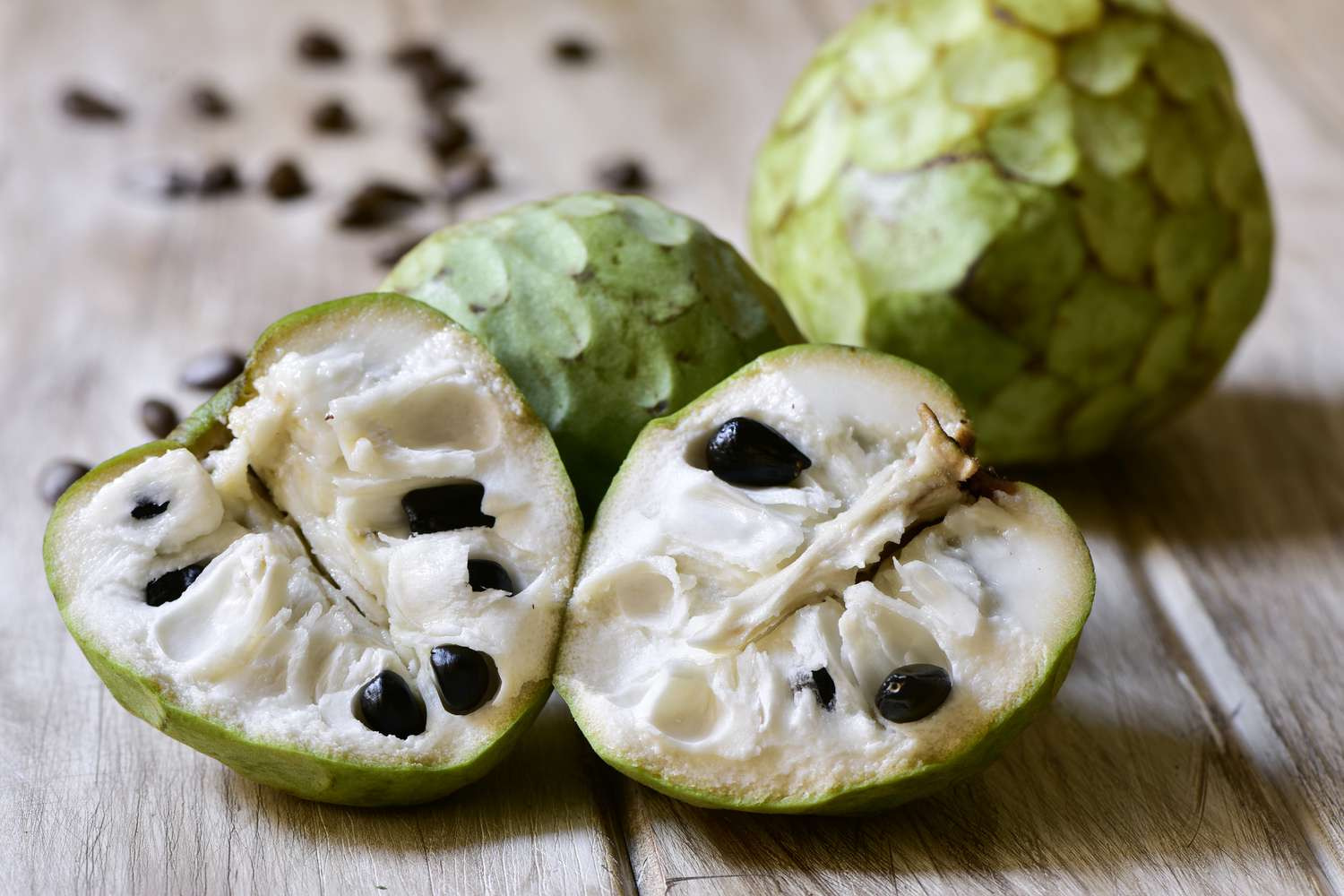
Chirimoya was so prized by the Inca that they cultivated it on royal estates. Mark Twain once called it “the most delicious fruit known to men.
Every South American country claims it, but Argentina arguably does it best. There, we said it! Dulce de leche, slow-cooked milk and sugar, is a thick caramel spread used on toast, churros, ice cream, alfajores (shortbread cookies) and just about every sponge cake on the continent. You'll find jars of it in every shop and dollops of it in nearly every dessert. Honestly, if one ingredient could be crowned the single most popular food in South America, it would probably be this one.
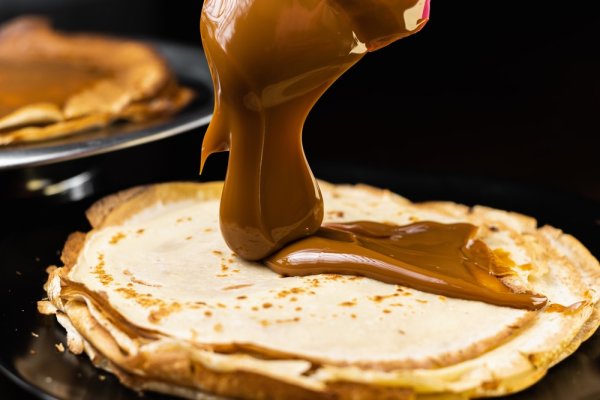
According to local legend, dulce de leche was invented by accident when a maid left milk and sugar boiling too long while distracted. Argentina’s sweetest mistake!
Simple but unforgettable, marraqueta is the crusty white bread you’ll find on just about every breakfast table in La Paz. Golden and crackly on the outside, soft in the middle, it’s best eaten fresh with butter, cheese, or avocado, and always with a cup of tea or coffee.
“I wasn’t expecting much from plain bread, but the first bite totally won me over,” says Pia. “It’s so crunchy and light—and insanely addictive.”
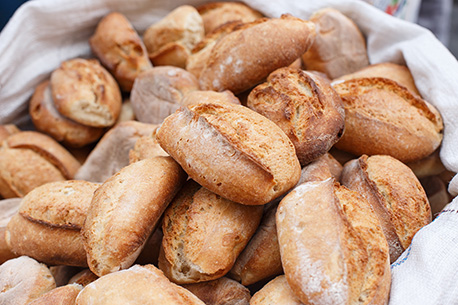
Marraqueta arrived with European immigrants but became so popular in Bolivia and Chile that locals joke it deserves its own national holiday.
Come festival time in Lima, street vendors roll out some of the best churros you’ll ever taste—thick, golden, and stuffed with warm manjar blanco, a rich caramel cream similar to dulce de leche. You’ll find them during the Virgen del Carmen celebrations in July, especially in older neighbourhoods where traditions run deep.
“These are proper churros,” says Pia. “Crispy outside, gooey inside, no frills. Just hot, sweet perfection.”
Some stands also offer them filled with crema pastelera, a creamy custard used in local baking. Pia recommends the famous vendor on Jr. Lampa between the San Francisco church and the Cathedral near Lima’s Plaza Mayor. Locals line up early for a reason, join them!
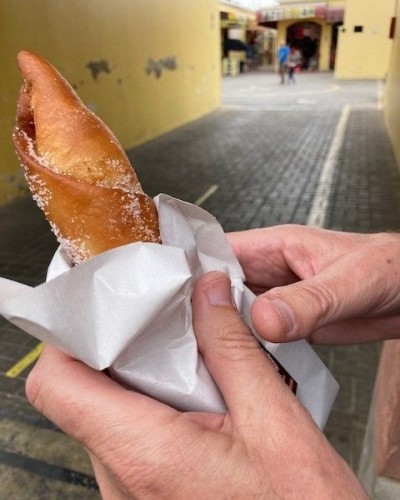
Nothing beats biting into a hot, gooey churro while wandering the backstreets of Lima during festival season.
If a banana and a potato had a love child, it’d be a plantain. These starchy cousins of bananas are a staple in the Amazon, sliced thick and fried until golden and crispy at the edges. Served alongside fish, rice, or cheese, they’re comforting, filling, and just the right kind of sweet. Luckily, you’ll find them served at breakfast, lunch, dinner, and every snack in between!
“This might sound ridiculous but out of everything on an Amazon trip, like jungle walks, river canoes, and wildlife, what I always look forward to most is the fried plantains,” laughs Flor. “It sounds silly, but they’re just that good!”
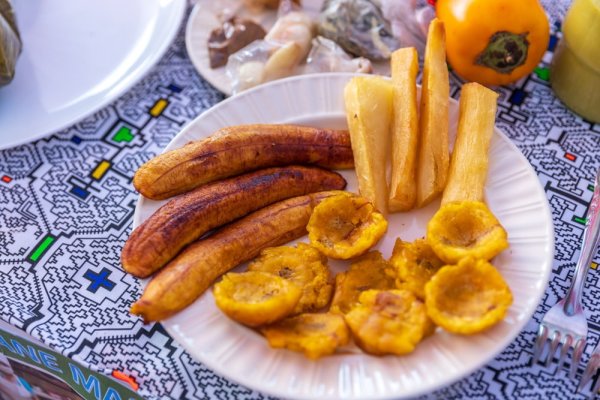
Plantains are the perfect Amazon side dish and impossible not to love.
Viva’s Best Food Travel Tip
"Ask locals where they eat. The best meals often come from hole-in-the-wall places with a bustling local crowd and no menu—and that's where the magic happens. So feel free to drill your hotel concierge, taxi driver, and tour guide for the best food in Latin America. Food pride is EVERYTHING on this continent. If you are an adventurous foodie, you'll be in for an absolute treat!" — Flor, Peru Specialist at Viva Expeditions.
Food only tells half the story in Latin America. The other half is served in a glass.
Neon-yellow and unapologetically sweet, Inca Kola is so much more than a soft drink: it's a symbol of unabashed Peruvian pride. "It tastes like my childhood," says Flor, "and somehow, it always hits the spot with salty snacks." Its flavour is somewhere between creaming soda and bubblegum, and yes, it's a taste that grows on you. You'll find this culinary speciality everywhere, from local corner shops to upscale restaurants. In 1995, Inca Kola became the only local soft drink in the world to outsell Coca-Cola on home turf!
Mate is a herbal infusion made from yerba mate leaves and hot water, traditionally sipped from a shared gourd using a metal straw called a bombilla. It is slightly bitter and earthy in flavour and is often shared among friends or family. You will often see people carrying their thermos and mate kit through parks, streets, or even on buses. In many places, mate is legally allowed in public spaces where other drinks are banned because it is considered cultural. The straw is not meant to be stirred, by the way. Doing so is seen as bad etiquette as it messes with the brew.
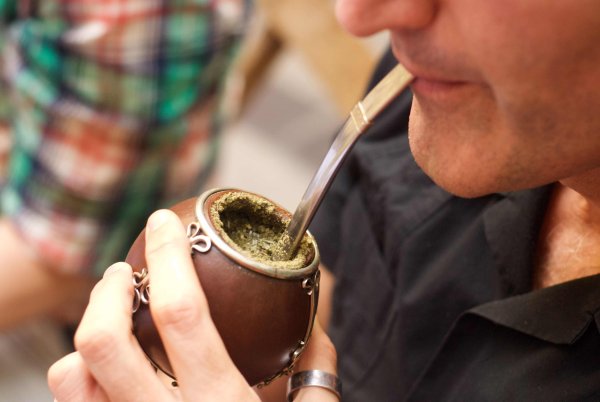
Argentina consumes more yerba mate per capita than coffee or tea, making it the country’s most popular daily drink.
Pisco sour is one of South America’s most famous cocktails. It is made with pisco, lime juice, sugar syrup, egg white, and bitters. Both Peru and Chile claim to have invented it, and the rivalry runs deep. In Peru, it is considered part of the country’s national identity and even has its own holiday in February. You will often find it served before meals, especially alongside fresh ceviche.
If you're visiting the Atacama Desert, look out for a version infused with rica-rica, a local herb that gives the drink a super crisp, fragrant twist.
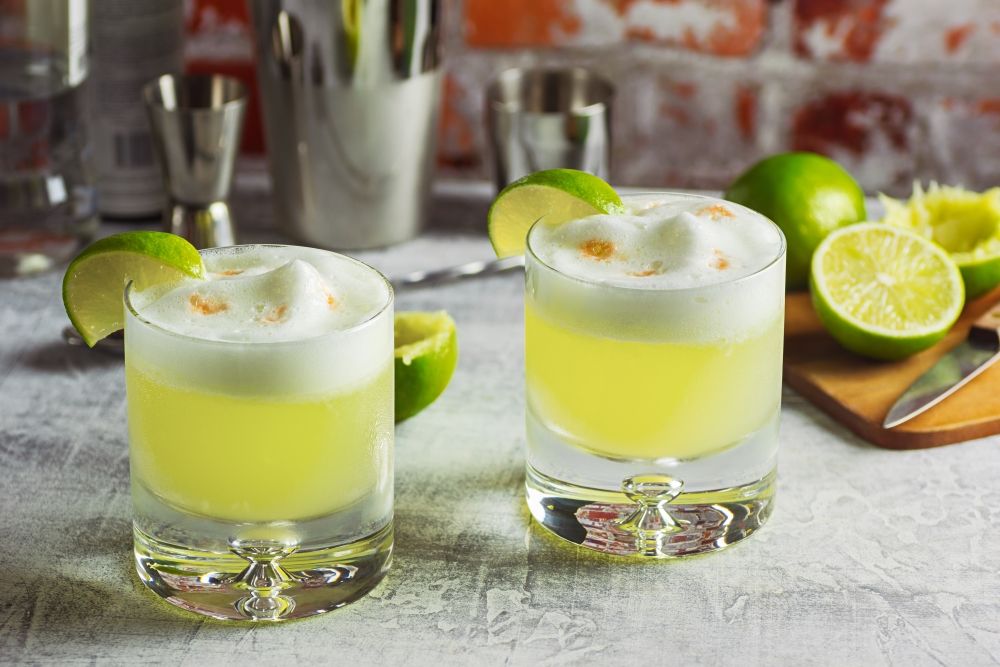
The earliest known pisco was distilled by Spanish colonists in the 1500s, making it one of the oldest spirits produced in the Americas.
Clear, strong, and tinged with anise, aguardiente is the party drink of choice across much of Colombia and parts of Ecuador. It’s usually poured straight into plastic cups and passed around with little ceremony, with just a nod and a grin as a warning. Each Colombian region produces its own version, and locals are fiercely loyal to their favourite.
In Ecuador, you might come across aguardiente flavoured with fruits or herbs, especially in the highlands. And if you’re in Arequipa, seek out Anís Najar, a smoother, more refined anise-based digestive that locals swear by.
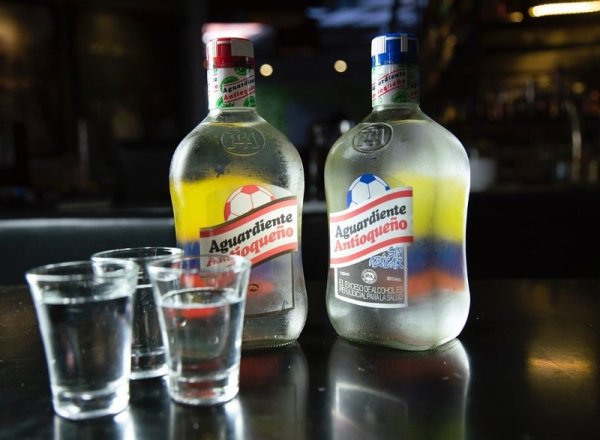
Some Colombian regions restrict sales of rival aguardiente brands to support their own distilleries—yes, it’s that serious!
Hungry yet?
These extraordinary foods and drinks are just the beginning. Truth be told, the best food in Latin America is often the one you stumble upon in a village, a street cart, or a family-run eatery with no name. Join us on a tour of Latin America and discover your own favourites. And if you come home addicted to dulce de leche or craving chirimoya from a mountain market ... don't say we didn't warn you!
Contact Viva today to start planning your unforgettable, and delectable, Latin America tour!
Laura PattaraLaura Pattara writes for Viva Expeditions with a special love for all things Latin America. She had guided overland tours across the continent, reached Machu Picchu five times on foot, and even dressed up as a giant toucan for Carnaval. With a degree in languages and two decades of global travel experience behind her, Laura has a long-standing love for the Andes, soaring condors, and a truly delicious empanada. |

Dynamic, sophisticated, irresistible; Buenos Aires is a seductive and attractive city just waiting to be explored.
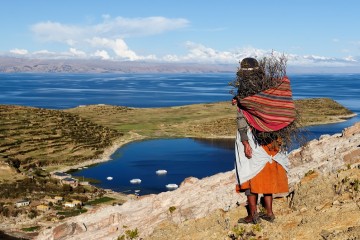
Add this on to our Signature Peru programme & visit the largest lake of South America and the highest navigable lake in the world!

Signature Tours: Refined, Simplified, Perfected
Premium itineraries carefully crafted by destination experts. Take in the very best of South America and Central America, with highly-rated hotels and exclusive authentic experiences.
Marvel at the pristine night skies, explore small villages, desert landscapes and journey across expansive salt flats in Chile, Bolivia and Argentina.